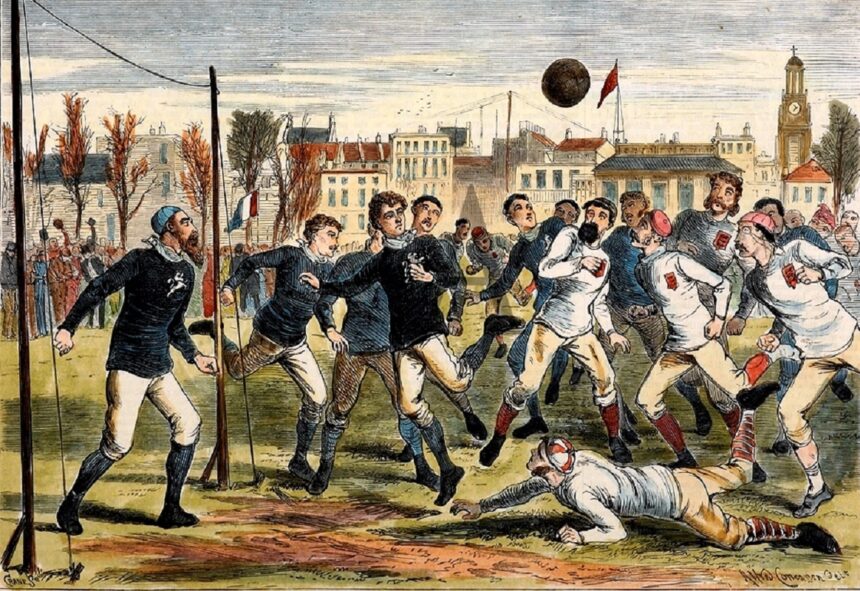Every weekend, millions of people gather around their televisions or in the stands of stadiums to watch 22 individuals chase a ball for 90 minutes. This game has become much more than just a sport; it’s a cultural phenomenon that brings together people from all walks of life. But do you know where it all started? Join us on an exciting journey as we unveil the origins of the world’s most loved sport and uncover the birthplace of football. From ancient civilizations to modern-day tournaments, get ready to discover how this beautiful game came into existence and why it continues to captivate hearts around the world!
Origins of Football
The birthplace of football may surprise you. Historians and scholars have long debated where the sport originated, but recent research has unveiled that the game wasn’t actually invented in England as many believe. In fact, according to new evidence uncovered by BBC Sport, football may have its roots in ancient China.
In 1861, Dr. James Cribb—an English doctor who was touring China at the time—wrote about the Chinese game “Football.” He noted that the game involved two teams of 25 players and was played on a rectangular field with a goal at each end. Cribb believed that this version of football was introduced to England by British sailors who had played it in China.
However, new research reveals that Football may have been played in Ancient India even earlier than Cribb claimed. A team of archaeologists from Italy’s University of Pavia recently excavated an ancient Indian site called Harappa which is thought to be around 4,500 years old. They discovered evidence that suggests Harappa residents were playing a version of football known as “kabbadi” back then.
So, while it’s true that football first originated in England, it might not have been the original way we think!
What Were the Rules of Medieval Football?
The history of football is an interesting one, with a lot of mystery and unanswered questions. While there are many theories as to how the sport evolved, little is known for certain.
According to some sources, football may have originated in England during the Middle Ages. During this time period, games resembling modern football were being played by groups of people on various fields across the country. It’s believed that the game was originally called “football.”
Some believe that rugby came first, and that football was simply an evolution of that sport. Others contend that English schoolboys developed football as a way to keep themselves entertained during long bus trips. Whichever true story is more accurate, it’s clear that football has been around for quite some time.
What Changed in 19th Century Britain to Create Modern Football?
In 1863, Ebenezer Cobb Morley published a book entitled “Football: Its Origin and Development.” In it, he proposed that football was imported to England from Scotland. This claim has been disputed by many historians, but what is certain is that football became increasingly popular in the 19th century.

One of the main reasons for this increased popularity was the development of organized football leagues. By 1871, there were already four regional leagues across England. The popularity of these leagues caused many clubs and players to form union contracts which regulated player transfers and wages. For example, in 1884, Derby County players formed the Football Association (FA) in order to establish better standards of play and protect their interests.
In addition to league play, 19th century Britain saw a significant increase in international matches between national teams. The first official international match took place on 15 May 1872 when England hosted Scotland at The Crystal Palace stadium in London. Since then, England has played host to numerous international matches, most notably the World Cup (which commenced in 1930). Consequently, the English game has developed into one of the world’s most popular sports.
The Role of the British Army in Developing Football
The story of football can be traced back to 1872 when a public exhibition was organized in London to celebrate the opening of parliament. One of the events at this exhibition was a game between Eton and Westminster schools, which resulted in Westminster winning 5-0. This match is generally cited as the first recorded example of football.
Although it is generally believed that football originated in England, there is evidence that the sport may have been played in Scotland since the 1600s. One theory suggests that football was invented by Scottish schoolboys as a way to keep themselves occupied during long teacher inspections.
Another important figure in the development of football was Charles Hughes, who is credited with being the father of modern rulebook Football Association rules. Hughes worked tirelessly to codify football so that it could be played using an agreed set of rules by all participating teams.
In 1863, representatives from six British army regiments met to establish an association responsible for organizing matches between their troops and civilian teams. This organization would later become known as The Football Association (FA).
During World War I, military units stationed overseas were allowed to participate in domestic league competitions. This gave British soldiers a taste for home-grown leagues and helped increase support for the FA amongst civilians back home.
Shortly after World War II, several English clubs travelled to Germany to play exhibition matches against top Bundesliga sides. These encounters helped stimulate interest in German football and paved the way for the start of professional league play in Germany.
Today, football is a global phenomenon. What advantages does it have over other sports?
Football has become a global phenomenon, with leagues and tournaments in almost every country. What advantages does it have over other sports?
One advantage is that football is a team sport. You can’t just go solo on the football field. This makes it more strategic, as players have to work together to achieve their goals. In other sports, like tennis or basketball, you can easily single out your opponent and try to beat them one-on-one.
Another advantage is that football is relatively fast paced. This makes it exciting to watch, as players are constantly moving around the field. Other sports can sometimes seem too slow and tedious for some viewers.
Last but not least, football has a deeper history than many other sports. Many people consider football to be the birthplace of the world’s most loved sport. This means that there is a lot of passion and history associated with it – something that adds an extra layer of excitement when watching matches!








